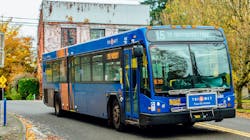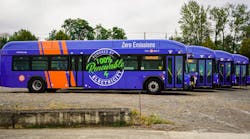TriMet’s Board of Directors adopted the agency’s Fiscal Year (FY) 2024 budget on May 24. The FY2024 budget totals $1.93 billion and includes $825.4 million in day-to-day operating expenses and $328.3 million in capital and operating projects. It incorporates a fare increase, which was approved by the board moments before the final adoption of the budget. The fare increase, TriMet’s first to adult fare in more than a decade, takes effect on Jan. 1, 2024.
The adopted budget supports the rollout of Forward Together, the first full-scale reformatting of TriMet’s bus service in agency history that was designed based on extensive community feedback. The Forward Together service improvements will bring more service to get to more places, for more people who rely on TriMet, especially those who make a low or lower income. It includes the addition of a lot more bus service – an increase of more than 30 percent from the COVID-19 pandemic.
The budget further advances the “A Better Red” MAX project, expands bus electrification and continues efforts to help riders with low incomes access transit. The FY2024 budget, which covers the fiscal year of July 1, 2023, through June 30, 2024, also supports TriMet’s five-year business plan and helps achieve strategic priorities identified for FY2024, which include rebuilding and earning new ridership, enhancing focus on safety and emphasizing inclusion, diversity, equity and access for riders, employees and community members.
The budget was reviewed and approved by Multnomah County’s Tax Supervising and Conservation Committee (TSCC), in accordance with Oregon budget law. Following the TSCC’s review, TriMet adjusted the budget totaling $10.6 million, based on updated, actual data, revenue and expenditure projections. The amount, which falls within limits allowed by the law, increased the total value of the budget to $1.93 billion.
Budget priorities
The FY2024 budget lays out support for priorities under four main categories:
- Transit service
- Capital investments
- Electrification
- Transit equity, inclusion and community affairs
Transit service: In addition to maintaining current levels of service across TriMet’s 533-square service district, the agency plans to begin restoring service hours that were cut in 2021 due to ridership declines from the COVID-19 pandemic and in 2022 due to the agency’s historic operator shortage. TriMet will implement the first bulk package of Forward Together service improvements in the fall and winter of 2023 and spring of 2024. Riders will see an overall increase in service hours of about seven percent, which will result in frequent service upgrades, where buses arrive every 15 minutes or better, more weekend service and service to new areas within the district.
Capital investments: TriMet plans to complete most of the remaining construction of the “A Better Red” MAX Extension and Reliability Project during FY2024. Once finished, the project will improve reliability of the entire MAX system, by adding new sections of track to alleviate choke points and extending the MAX Red Line to Hillsboro/Fair Complex, which will give more people a one-seat ride to Portland International Airport and provide more service in Hillsboro.
Electrification: TriMet has accepted delivery of 24 new battery-electric buses. The buses make up the first bulk purchase of electric vehicles since adopting the plan to fully transition to a zero-emissions bus fleet by 2040. In addition to buying battery-electric buses, electrification requires significant investments in infrastructure and training to charge and maintain the buses.
Transit equity, inclusion and community affairs: Since TriMet opened its reduced fare to riders who qualify based on income in 2018, more than 50,000 have signed up to ride for significantly less. The Honored Citizen reduced fare, which is also open to seniors age 65-plus, people on Medicare and people with disabilities, cuts the cost of riding monthly and annually by as much as 72 percent. TriMet’s FY2024 budget continues to support riders who are struggling financially through the Access Transit Program, which works with local nonprofits and organizations to get free and reduced fares to riders who need them.




